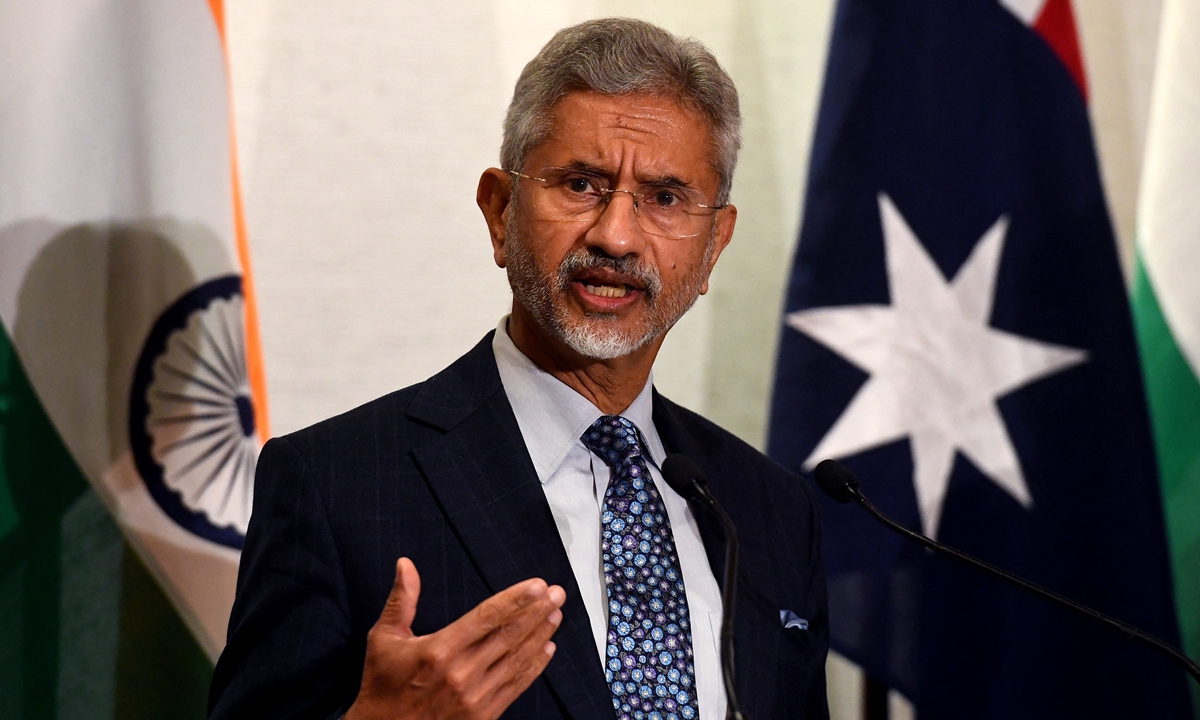
Indian External Affairs Minister Subrahmanyam Jaishankar Photo: AFP
Addressing a joint news conference in Melbourne after a bilateral meeting with his Australian counterpart on Saturday, Indian External Affairs Minister Subrahmanyam Jaishankar criticized China for "disregarding" the "written agreements" with India in regard to the current situation of the Line of Actual Control (LAC), and said it is "an issue of legitimate concern for the entire international community." Jaishankar paid a visit to Australia from Thursday to Sunday, during which he attended the 4th Quad foreign ministers' meeting along with counterparts from Australia, Japan and the US.
Such rhetoric echoes India's stubborn stance since the Galwan Valley clash between China and India in 2020. Although Beijing and New Delhi have reached a consensus to settle the boundary dispute through bilateral dialogue and consultation, India has not changed its unreasonable demands, and is piling more pressure on China on some multilateral issues, hoping to gain support from anti-China forces in countries like the US and Australia. New Delhi may believe this can help increase its leverage in negotiating with China over the border disputes.
India cannot realize its intention in this regard. The root of its confrontations with China is India's infrastructure construction in disputed border areas for the purpose of military surveillance.
Ignoring this fact, India seems to have engaged in megaphone diplomacy in the international community. But no matter how noisy it is, it cannot change the fact that it is India which is responsible for the deterioration of China-India relations, and thereby will fail to gain support from the international community.
Furthermore, India regards itself as a major power and repeatedly reiterated that it is against third-party mediation in its talks with China. But New Delhi's discussion with Canberra over its border issue with Beijing seems to go against India's position. India may realize its comprehensive strength is still way behind that of China. And it will not get its expected result on its own. But its attempt to gain support from a third party will backfire, and be detrimental to the settlement of India's disputes with China.
These sharp remarks against China from Jaishankar, who "is usually very diplomatic in his choice of words, especially on China, more so while speaking from foreign soil," "reflect Delhi's frustration over Beijing's behaviour ever since the start of the military standoff along the Ladakh frontier in May 2020," India Express commented. The word "frustration" is not accurate here. Instead, Jaishankar's hard-line rhetoric is more like anger from embarrassment as New Delhi's unreasonable demands over the border disputes with China cannot be met.
It is noticeable that a day ahead of Jaishankar's tough remarks, the White House issued its new Indo-Pacific Strategy, which said that the US will strengthen "relationships with leading regional partners, including India" and will support "India's continued rise and regional leadership."
The US' holding of a Quad foreign ministers' meeting and announcing its Indo-Pacific Strategy amid the Beijing Winter Olympics has clearly taken China as a target. Jaishankar must have clearly known that his sharp words would have a negative impact on India's relations with China. His insistence on dancing with the US, Japan and Australia demonstrates India's stance on moving closer to the Quad mechanism in regards to issues on China. This is also a kind of diplomatic balancing act after Russia-India relations were heated up by Russian President Vladimir Putin's visit to India in December, making the US unhappy.
These practices embody India's speculative mentality in terms of diplomacy. Washington pushed a Quad foreign ministers' meeting amid the Ukraine crisis and mentioned the importance of India in its new Indo-Pacific Strategy. The Biden administration's emphasis over the Indo-Pacific region has not declined because of the changes of the European situation. It may ease New Delhi's distrust over the US because of Washington's withdrawal from Afghanistan.
India will take advantage of the relationship among China, the US and Russia to seek a favorable position out of such a speculative mentality. Between China and the US, India will continue to pursue a dynamic balance. New Delhi needs Washington's endorsement in dealing with China. Meanwhile, as China is an important neighbor, India will not completely sour China-India relations. India will not become a frontline country in countering China as the US hopes to see, because it will go against India's national interests.
The author is director of the research department at the National Strategy Institute at Tsinghua University. opinion@globaltimes.com.cn




